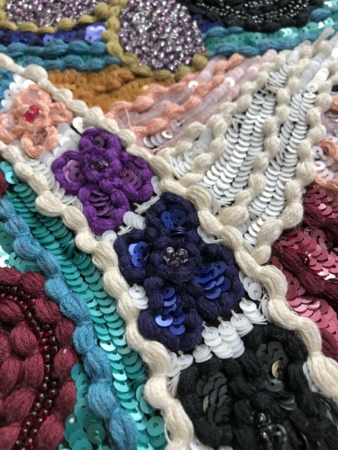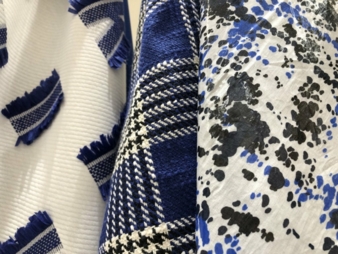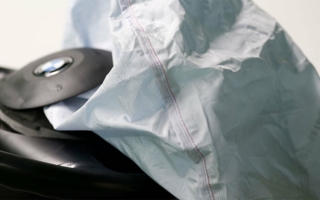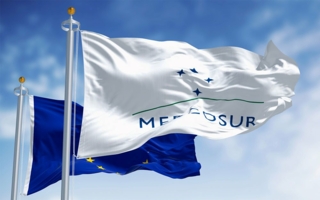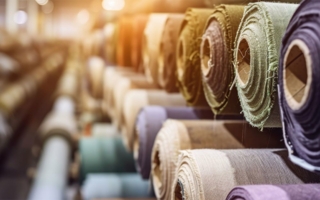28/03/2019 – Textile trade fairs spring/summer 2020 — auf Deutsch lesen
Slamming on the brakes
The European textile trade fairs marking the spring/summer fashion season 2020 were all characterised by uncertainty in the face of looming trade barriers and poor economic forecasts.
Not only that, but a disappointing winter season has left a dark mark on Germany’s ready-to-wear manufacturers.
Even the marginal falls in visitor numbers posted by the February editions of the European textile fairs – Munich Fabric Start in Munich (D), Milano Unica in Milan (I), Première Vision and Texworld in Paris (F) – are indicative of a market that is “slamming on the brakes”. Across the board, exhibitors are talking of widespread “uncertainty”. Every bankruptcy that hits the headlines – most recently German womenswear company Gerry Weber – only fuels these fears still further. And every design team that no longer appears at a fair steadily gnaws away at the visitor figures.
“I’ve never seen anything quite like it,” sighs an experienced salesman from a European weaving mill at Première Vision Paris. Munich Fabric Start (more than 1,000 exhibitors) reported an official total of 19,800 trade buyers, corresponding to a 3 percent decline on last year. Première Vision in Paris-Villepinte (1,782 exhibitors) officially posted 53,156 visitors, down 2.3 percent on the same event last year. At Milano Unica in Milano-Rho (I), 421 exhibitors met representatives from 6000 companies. The organiser did not release more precise figures.
Problem areas
In Germany, the poor performance in the winter season has turned many a sales plan on its head. Internationally, weaving mills such as KG Denim from India also spoke of a quieter winter. Commenting at Munich Fabric Start, it was agreed that there is currently very “little movement” on the market. Moreover, compared to its competitors in Pakistan, the Indian company has to contend with considerably higher duties on deliveries to countries such as Turkey where many European customers have their products manufactured.
Brexit was also on everyone’s lips at the trade fairs. Premier Vision witnessed a 16 percent slide in the number of Brits wending their way to Paris. Organisers put this down to uncertainty in the marketplace caused by the UK’s looming exit from the European Union. Whenever the topic was broached, exhibitors could do no more than shrug their shoulders. To many, discussing a topic whose outcome is so unpredictable seems ever more superfluous. And yet, the fear and worry remain palpable. The UK, for example, is one of the most important sales markets for Frieba, Textilwerk Carl Friedrich GmbH & Co., the Wuppertal-based braiding and crochet specialist. Uwe Hein does not deny feeling “a sense of uncertainty”, but refuses to give into “scaremongering”. “Life will go on after Brexit,“ states Hein. And yet, the composure shown by a company that celebrates its centenary this summer feels very much like a dose of valium administered to a jittery market.
Sourcing reimaged
The USA’s rather irritating trade policy is likewise causing quite an unpleasant stir. Production countries such as Peru, Colombia, Mexico and Pakistan are increasingly seeking greater economic proximity to Europe. This was pointed out by Yvan Dacquay, who is in charge of the Manufacturing – Overseas Division (37 exhibitors) at Première Vision Paris and has recently seen a sharp increase in the number of companies exhibiting from these countries. By contrast, the likes of Ethiopia, Cambodia and Vietnam are increasingly replacing China as low wage production locations, not least because they are also embracing huge advances in processing and design, says Dacquay. The Ethiopian government has, for its part, launched a programme for its domestic textiles and apparel industry, which is hoped to create 350,000 jobs (150 companies) in the sector by 2022. According to Texworld, which is organised by Messe Frankfurt France, it is already being eyed by investors from Turkey, China and India. Backed by the Federal Ministry for Economic Cooperation and Development, the German society for international cooperation GIZ is supporting this offensive. Moreover, five Ethiopian textiles companies are appearing at the next Texworld (1,000 exhibitors ) in Paris-Le Bourget.
New business models
“Our industry is searching for new pathways,” concludes Sebastian Klinder, Managing Director of Munich Fabric Start, in the final report on the last event, noting that “process engineering and synergies” are having an increasingly large impact on the modern exhibition business. Getzner, the Austrian maker of dress shirt and blouse fabrics, is also delighted that the market is finally taking the topic of sustainability seriously. This trend is confirmed by Dagmar Signer, Marketing Manager at the Swiss company Schoeller Textiles. In this context, she also refers to the circular economy which is increasingly being understood as a common task to be tackled by a variety of different partnerships, extending from the fibre to leased parts on an industrial level.
Regine Hövelmann

